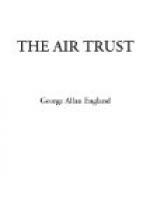At this magnificent piano the girl now seated herself, on a bench of polished teak, from Mindanao. And, turning to her father, who had sunk down in his favorite easy-chair of Russia leather, she asked with a smile:
“Well, daddy, what shall I play for you, to-night?”
He looked at her a minute, before replying. Never had she seemed to dear, so beautiful to him. The rose-tinted light that fell softly from a Bohemian chandelier over her head, flooded her coiled hair, her face, her hands, with soft warm color. The slight dressing that her wound now required was covered by a deft arrangement of her hair. She had regained her usual tint. Nothing now told of the accident, the close call she had had, from death, so short a time before. And old Flint smiled, as he answered her:
“What shall you play? Anything you like, my dear. You know best—only, don’t make it too classical. Your old father isn’t up to that ultra music, you know, and never will be!”
She smiled again with understanding, and turned to the keyboard. Then, without notes, and with a delicate touch of perfectly modulated interpretation, she began to render “Trauemerei,” as though she, too, had been dreaming of something that might have been.
Flint listened, with perfect content. The music soothed and quieted him. Even the foreknowledge of the difficult task that lay before him, the interview that he must have with his daughter, faded from his mind, a little, and left him wholly calm. Eyes closed, every sense intent on the delicious harmony, he followed the masterpiece to the end; and sighed when the last notes had died away, and kept silence.
Then Kate, still needing no music on the rack before her, played the “Miserere” from “Il Trovatore,” a Hungarian “Czardas,” Mendelssohn’s “Fruehlingslied” and the overture from “William Tell.” She followed these with the “Intermezzo” and the “Pizzicato” from “Sylvia,” and then with “Narcissus” and “Sans Souci.” And at the end of this, she paused again; for now her father had arisen and come close to her. With a hand on her shoulder, looking down at her with stern yet kindly eyes, he said:
“‘Sans Souci’? That means ‘Without Care,’ doesn’t it, Kate?”
“Yes, Daddy. Why?” she answered.
“Oh, I was just thinking, that’s all,” said he. “It made me wish I had no cares, no troubles, no sorrows.”
“Sorrows, father? Why should you have sorrows?” she queried, turning to him and taking both his shriveled hands in her warm, strong ones.
“Sorrows? Why shouldn’t I?” said he. “Every man of large affairs has them. Every father has them, too.” And he bent over her and kissed her, with unusual emotion.
“Every father?” asked she. “What do you mean? Am I a sorrow to you?”
“A joy in many ways,” he answered. “In some, a sorrow.”
“In what ways?” she asked quickly, her eyes widening.




